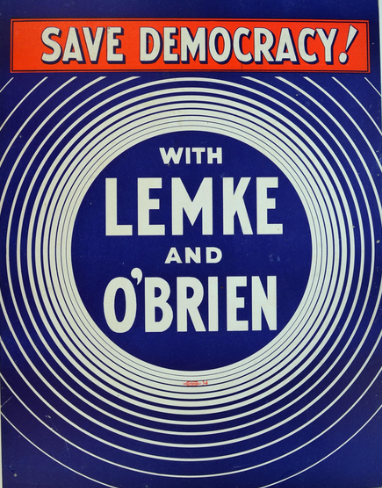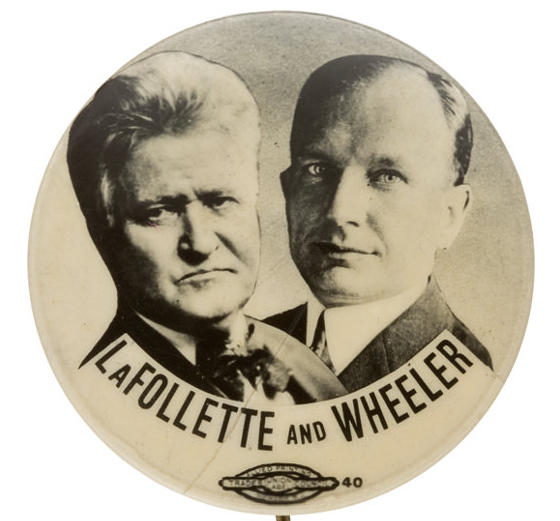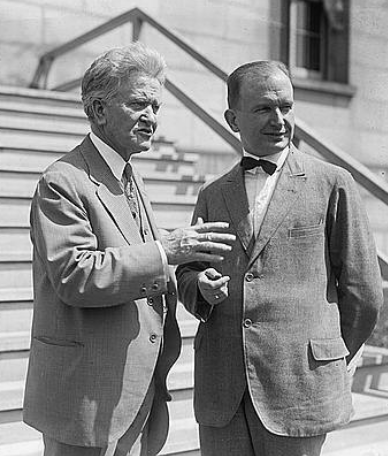Showing posts with label Burton Kendall Wheeler. Show all posts
Showing posts with label Burton Kendall Wheeler. Show all posts
Saturday, December 7, 2019
Robert Craig Knievel
Robert Craig Knievel, October 17, 1938 (Butte, Mont.) – November 30, 2007 (Clearwater, Fla.)
VP candidate for Magneto-hydrodynamics-Puritan Epic-Prohibition Party (aka Puritan Epic Party aka Puritan Epic, Prohibition and Magnetohydrodynamics Party) (1976)
Running mate with nominee: Merrill Keith Riddick (1895-1988)
Popular vote: 0 (0.00%)
Electoral vote: 0/538
The campaign:
Merrill Riddick, one of Montana's more colorful perennial candidates, grew up in a political household. His father Carl was a US Congressman (R-Mont.) 1919-1923 and in 1922 lost an open-seat election for the US Senate to none other than future third party Vice-presidential candidate Burton Kendall Wheeler.
The son Merrill became an early aviator and flight instructor as well as a prospector. He grew interested in politics following World War II and ran for Governor of Montana a couple times as a Democrat, then switched to the Republican Party and ran for the US Senate. By 1976 he aimed higher and began his first of three attempts for the US Presidency under a third party of his own creation called the Magneto-hydrodynamics-Puritan Epic-Prohibition Party (in a later election he squeezed the word "Ethic" into the name somewhere). Not a believer in accepting special interest monetary contributions, he campaigned across the nation as a passenger in a Greyhound bus and was financed by his Social Security checks.
Riddick had a focus on managed use of natural resources and changing the election laws by eliminating public funding for the two major parties and making it easier for third parties to gain ballot access: "They're just trying to keep things as they are instead of allowing a new party to come in. The whole thing is geared so a new party can't break through. The Constitution said if you don't like something, change it."
Riddick mentioned he would like to tie his new party somehow into the Prohibition Party, but the idea didn't seem to be followed by action.
Since Jimmy Carter's campaign gained a lot of attention from his Playboy interview, Riddick offered to be interviewed as well by the magazine but was turned down.
Riddick originally announced Lim Bow, an artist in Coos Bay, Oregon, as his running mate. But a week or two later he changed his mind apparently due to what one newspaper called "a disagreement on how to conduct the campaign arose." Riddick then told newspapers he now wanted famed motorcycle daredevil Richard C. "Evel" Knievel as his VP. Knievel's response, if any, has not been recorded. Riddick said finding a Vice-Presidential candidate for his party was difficult, "The minute I name a Vice-President, boy you should see them duck."
He later qualified his announcement about Knievel saying he didn't actually contact the stunt artist directly. It appeared he was hoping the news coverage itself would serve as a formal offer. By default Evel Knievel became the VP nominee for the remainder of the election season.
Like Knievel, Riddick himself had been a daredevil in his youth. He flew alongside Charles Lindbergh as part of a flying circus and perhaps admired Evel with the eye of a colleague.
In an event not related to the campaign, Knievel emerged from a short-lived retirement and motorcycle-jumped over seven Greyhound buses at the Seattle Kingdome in late October, 1976. Between Riddick's reliance on the bus to campaign, and Knievel's highly publicized Seattle stunt, you would think the Greyhound Company would have enjoyed all the free advertising from this obscure Presidential ticket.
Merrick ran for President again in 1980 (with a different running mate) and 1984 (apparently without a running mate). The day after the 1976 election he announced he was running in 1980. He was 89 years old during his final run for the presidency in 1984.
Election history: none
Other occupations: mining employee, entertainer, stunt daredevil, soldier (US Army), insurance salesman, motorcycle dealer, actor
Buried: Mountain View Cemetery (Butte, Mont.)
Notes:
Evel had a lot of Washington State connections including:
--Lived in Moses Lake and Sunnyside, Wash. in the 1960s.
--Among his long list of serious stunt-related injuries were two at Graham, Wash. in July and Aug. 1967.
--In the 1970s one of my neighbors (Jace Knievel, 1952-2017) in Olympia, Wash. claimed to be a close relative of Evel and said the family surname was pronounced "Nye-ville" as his was.
Saturday, July 20, 2019
Maynard C. Krueger
Maynard C. Krueger, January 16, 1906 (Gregory Landing, Mo.) – December 20, 1991 (Pleasanton, Calif.)
VP candidate for Socialist Party of America (1940)
Running mate with nominee: Norman M. Thomas (1884-1968)
Popular vote: 116,599 (0.23%)
Electoral vote: 0/531
The campaign:
The tattered remains of the Socialist Party of America after years of infighting and splits left a small group that would be in a defensive damage control mode as they regrouped. The headquarters was moved from Chicago to New York. This would be Norman Thomas' fourth run for US President. His running mate, university professor Maynard C. Krueger was considered a member of the "militant" left wing of the party.
Krueger's age, under the Constitutional requirement of 35 became an issue, but he pointed out that by Inauguration Day he was would be 35 years and 4 days old.
As war waged in Europe, the SPA's antiwar platform took a pacifist nonintervention stance, condemning US aid to the UK and France.
Montana Democratic US Sen. Burton Wheeler (the 1924 VP nominee of the Progressive Party) revealed years later he voted for the Thomas/Krueger ticket in 1940. Wheeler himself had been urged to run as an isolationist third party candidate.
With votes recorded in 30 states the SPA's best results were in Wisconsin (1.07%), Maryland (0.62%), Washington and Montana (both 0.58%). Although the Thomas/Krueger ticket's national percentage was dismal they still came in third. In 1940 all of the third parties results combined total amounted to less than 1%.
Election history:
1948 - US House of Representatives (Ill.) (Independent) - defeated
Other occupations: University professor in economics and social sciences (Albion College, University of Pennsylvania, University of Chicago), Vice-President of the American Federation of Teachers 1930s, author
Buried: cremated.
Notes:
Surname rhymes with "eager"
Was an associate of George Orwell in Paris in the late 1920s.
Left the SPA in 1952 and endorsed Adlai Stevenson that year.
Sunday, July 14, 2019
Thomas Charles O'Brien
Thomas Charles O'Brien, June 19, 1887 (Boston, Mass.) – November 22, 1951 (Boston, Mass.)
VP candidate for Union Party (aka Royal Oak Party aka The Third Party) (1936)
Running mate with nominee: William F. Lemke (1878-1950)
Popular vote: 892,378 (1.95%)
Electoral vote: 0/531
The campaign:
One historical theory behind the creation of the Union Party was that Louisiana Governor Huey "Kingfish" Long or one his surrogates would be the nominee of the new third party, splitting the Democratic vote and robbing FDR of his re-election victory. Then in 1940 Long would ride in to the country's rescue as the new President. But Long's 1935 assassination ended that alleged strategy.
The concept became reality to a degree. The Union Party was a confederation of three groups who had one thing in common-- they hated FDR. Here is how I described the leaders of the factions in an essay I wrote in 2008:
Dr. Francis Everitt Townsend (1867-1960) had proposed in 1933 an old age pension plan for retired citizens over the age of 60– grants of $200 a month funded by a 2% national sales tax. A plan like this would’ve been considered socialist in the 1920s, but the reality of the Great Depression made labels less important. The idea took off like wildfire and Townsend Clubs spread by the thousands all over country. In Washington State, over 400 such clubs were in existence by 1950, including places such as Montesano and Satsop ... The Townsendites have been credited by historians with helping to prod the government into creating the Social Security system.
Father Charles E. Coughlin (1891-1979) was a religious/political activist who used radio as his main medium. At first a strong supporter of FDR, he quickly became a bitter and vocal opponent. Coughlin saw Wall Street and Communism as two sides of the same monster, and became increasingly antisemitic and pro-fascist as the decade regressed internationally. I’m not using the term "fascist" as rhetoric, by saying so I mean he really expressed sympathy for Hitler and Mussolini and their treatment of the Jews in Europe. In 1936 the Socialist Party candidate for President denounced the Union Party as fascist, based mostly on Father Coughlin’s presence.
Gerald L.K. Smith (1898-1976) had inherited the Share Our Wealth movement from the freshly assassinated Louisiana demagogue Huey Long. Originally a Disciples of Christ radio evangelist, Smith eventually aimed the SOW program into a white supremacy movement. He later became a prominent American Holocaust denier and all-around hate-spewing nutcase.
The historian William Manchester gives his take on the Union Party: "… Father Coughlin and his colleagues preempted the lunatic fringe, presenting for the voters’ consideration their new Union Party. The Union candidate for President was Congressman William Lemke of North Dakota, a strange individual with a pocked face, a glass eye, and a shrill voice; to the radio priest’s dismay he insisted upon wearing a gray cloth cap and an outsize suit. Coughlin baptized him ‘Liberty Bill,’ and Gerald L.K. Smith drew up plans to guard the November polls with a hundred thousand Townsendite youths. The radio priest promised to quit the air forever if he didn’t deliver nine million votes for the Union ticket. That seemed extravagant, but in June both major parties were taking Lemke seriously … The sobriquet ‘Liberty Bill’ was catching on. Father Coughlin rather liked the alliterative resemblance to ‘Liberty Bell.’ Then, too late, he remembered something: the Liberty Bell was cracked."
The Union Party belonged to Coughlin more than anyone else. After attempting to lure Northern Tier Senators William Borah of Idaho, Burton Wheeler of Montana (the Progressive Party VP nominee in 1924), or Floyd B. Olson of Minnesota, the Party settled on Republican Rep. Lemke. For VP they chose Boston Democrat Thomas Charles O'Brien.
O'Brien was simultaneously running for the US Senate in Massachusetts as a member of the Union Party in race that would be won by Republican Henry Cabot Lodge Jr.
Lemke and Coughlin predicted an Electoral College deadlock to the press, but in the end it was an enormous Roosevelt landslide. With votes recorded in 37 states the Lemke/O'Brien ticket finished strongest in Lemke's home state of North Dakota (13.41%), followed by Minnesota (6.58%), Massachusetts (6.45%), Rhode Island (6.29%), Oregon (5.27%), Wisconsin (4.79%), Ohio (4.39%) and Michigan (4.20%).
The Union Party fell apart after the election. FDR's administration had managed to co-opt several of their economic issues.
Election history:
1912 - Massachusetts House of Representatives (Democratic) - defeated
1913 - Massachusetts House of Representatives (Democratic) - defeated
1914 - Massachusetts State Senate (Democratic) - defeated
1925 - Mayor of Boston, Mass. (Nonpartisan) - defeated
1930 - Democratic primary for US Senate (Mass.) - defeated
1936 - Democratic primary for US Senate (Mass.) - defeated
1936 - Republican primary for US Senate (Mass.) - defeated
1936 - Governor of Massachusetts (Union Party) - defeated
Other occupations: baggageman, brakeman, soda clerk, bicycle repairman, labor attorney, Massachusetts Board of Parole 1913-1916, appointed District Attorney for Suffolk Dist. 1922-1927, Massachusetts Deputy Director of Prisons 1916-1919, Boston's Commissioner of Penal Institutions 1919
Buried: ?
Notes:
Catholic.
Died from a heart attack.
Graduate of Harvard and Harvard Law School.
Sunday, June 30, 2019
Burton Kendall Wheeler
Note how Sen. La Follette makes up for the height difference in spite of the tall hair
Wheeler and 1912 Progressive Party VP nominee Sen. Hiram Johnson
Burton Kendall Wheeler, February 27, 1882 (Hudson, Mass.) – January 6, 1975 (Washington, DC)
VP candidate for Progressive Party (aka Independent Progressive Party) (1924)
Running mate with nominee: Robert M. La Follette (1855-1925)
Popular vote: 4,831,706 (16.61%)
Electoral vote: 13/531
The campaign:
Wisconsin Republican Senator Robert La Follette and Montana Democratic Senator Burton K. Wheeler combined forces in a significant third party effort that enjoyed high voter turnout in the Northwestern quarter of the US and the Far West. More agrarian and radical than the the previous Bull Moose Progressive Party, this new incarnation even gained the endorsement of the Socialist Party of America and the American Federation of Labor.
The VP nomination was first offered to Justice Louis Brandeis, who declined. Wheeler was then given the opportunity and after some consideration decided to accept. He did not renounce his loyalty to the Democratic Party, but could not support Davis. "I am a Democrat but not a Wall Street Democrat," Wheeler explained. He also wanted to use the VP nomination as a way to make his Senate investigations into the Harding scandals more public.
The platform included stands that were anti-monopoly, pro-free speech, pro-equal rights for women, pro-public ownership of utilities, promotion of public works, pro-public control of natural resources, pro-union, and anti-war.
Wheeler used the empty chair gimmick while "debating" an absent Coolidge apparently to great acclaim. Clint Eastwood attempted the same showmanship at the 2012 Republican National Convention but comic timing was not his forte.
It was the 5th largest popular vote percentage for a third party in US history, surpassed since then only by Ross Perot in 1992. It was the 7th best third party vote from the Electoral College.
On the ballot in every state except Louisiana, the La Follete/Wheeler ticket won the standard bearer's home state of Wisconsin (53.96%) and placed second in 11 more states, nearly winning in North Dakota. After Election Day La Follette and Wheeler returned to their parties of origin.
Wheeler later reflected: "Our trouble was that we were ahead of the times. The Progressive Party platform of 1924 became the ideological basis for the New Deal in 1933 and much of it found its way to the statute books by 1935."
Election history:
1910-1912 - Montana House of Representatives (Democrat)
1920 - Governor of Montana (Democrat) - defeated
1923-1946 - US Senate (Mont.) (Democrat)
1946 - Democratic primary for US Senate (Mont.) (Democrat) - defeated
Other occupations: traveling book salesman, stenographer, attorney, Delegate to the Democratic National Convention 1932-1940, US District Attorney of Montana 1913-1918
Buried: Rock Creek Cemetery (Washington, DC)
Notes:
Buried in the same cemetery as Alice Lee Roosevelt Longworth, Frank Mankiewicz, George S.
McGovern, Tim Russert, Upton Sinclair, and Gore Vidal.
Was headed to Seattle to start his law career but lost his shirt in a poker game in Butte, Mont. along
the way and stayed.
Author of the Wheeler Resolution limiting AM radio to 50,000 watts.
Broke with FDR over the court-packing plan and later became an isolationist until Dec. 7, 1941.
Isolationists urged him to run as a third party presidential candidate in 1940.
If La Follette/Wheeler had won in 1924, Wheeler would have been President June 18, 1925 upon the
death of La Follette.
Subscribe to:
Comments (Atom)







































